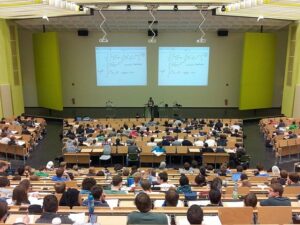Homeschooling Achievement Scores
 Homeschooling achievement scores on standardized tests consistently show that homeschooled students score competitively with public schools. Many studies even show that homeschooled students score better than students from public schools.
Homeschooling achievement scores on standardized tests consistently show that homeschooled students score competitively with public schools. Many studies even show that homeschooled students score better than students from public schools.
Homeschooled Students and Their Achievement Scores
Homeschooled students score about 72 points higher than the national average on the Scholastic Aptitude Test (SAT) and at the 77th percentile of the American College Test (ACT).
Homeschooling advocates will often point to these results to demonstrate how homeschooling works and that students perform better than in public schools.
Critics will say that these higher scores are due to compounding factors that give a learning advantage to the homeschooled student.
For example, not every home-schooled student takes the SAT or ACT test as they may not be interested in going to college but rather seek vocational education. Home-schooled children tend to come from more advantaged households where one of the parents may not have to work and can stay home with their children.
Demography Associated with Homeschooling Achievement Scores

Pencils for achievement tests
A study from Northeastern State University in 1999 titled “The Correlational Relationship between Homeschooling Demographics and High Test Scores” proposes the demographic argument. This argument proposes the reason why homeschooling achievement scores are higher is due to the following,
- homeschoolers watch less television
- homeschoolers have richer, more educated parents
- have homes with two parents
These demographic differences promote greater learning and achievement independent of being homeschooled.
A US Department of Education study supported the notion that homeschoolers have improved demography and educational opportunities. They note that homeschooled parents are about twice as likely to have advanced degrees, even though the percentages with some college education are similar in both groups.
Homeschool Progress Report 2009
Previous studies of homeschoolers’ achievements largely failed to evaluate the confounding factors associated with demographics, as noted above. The Homeschool Progress Report 2009 attempted to factor in these considerations.
The study found that,
Homeschoolers are still achieving well beyond their public counterparts – no matter what their family background, socioeconomic level, or style of homeschooling.
Homeschoolers in this study showed the financial resources of homeschoolers’ families and those in public school were about equal,
Homeschoolers’ median family income ($75,000 – 79,999) closely spanned the nationwide median (about $79,000) for families headed by a married couple and with one or more related children under 18.
The report also evaluated households concerning parental educational achievements,
Students whose parents both had a college degree performed better than those who had no parent with a college degree. However, this correlation is generally weaker. for homeschool students than than for public school students.
Te homeschooled students whose parents did not have college degrees still performed at the 83rd percentile.
The study also evaluated test scores in homeschooled students concerning gender,
Homeschooled boys (87th percentile) and girls (88th percentile) scored equally well; the income level of parents did not appreciably affect the results (household income under $35,000: 85th percentils – household incomes over $70,000: 89th percentile); and while parent education level did have some impact, even children whose parents did not have college degrees scored in the 83rd percentile, which is well above the national average for public school students. Homeschooled children whose parents both had college degrees scored in the 90th percentile.
Disadvantages of Homeschooling

Children are playing baseball.
Students from homeschooling environments do seem to perform better on academic achievement tests. But there are other considerations that parents much evaluate before homeschooling their children.
Perhaps the most important consideration for many parents is the time required to homeschool their children. Some students are self-learners, while others need some discipline imposed by their parents.
Homeschooled children have other disadvantages as well. One which has gained much attention in studies of homeschooled children is the socialization aspect. They are not exposed to as many people from diverse backgrounds, limiting their exposure to diverse cultures and ideas.
But another aspect of the homeschooling socialization experience surpasses the public school. In a public school, children are all grouped together by age. Children socialize, but their experience is limited to their own peers. Homeschooled children have the advantage here as they are often exposed to children of various ages. This broadened exposure is facilitated by coops. a co-op
is made up of several families who meet regularly at libraries, churches, community centers, or homes and work together toward similar goals, which can be based on socialization, education, activities, or any combination of these.
When done correctly, homeschooled children are better socialized than their public school peers. A metastudy evaluated the impact of homeschooling,
The search for peer-reviewed reports on the social development of home-educated children and adults revealed 15 studies. Thirteen of the 15 showed clearly positive outcomes for the homeschooled compared to those in conventional schools.
There are also definite advantages, such as reduced bullying, shaming of other students, and imposition of alternative belief systems by school personnel. Certainly, critical race theory and the sexualization of early middle school students by certain activists have many parents considering alternative educational opportunities for their children, and homeschooling has become an increasingly popular option for them to consider.
Homeschoolers and College

College classroom – Image by Nikolay Georgiev from Pixabay
In the United States, approximately 3.4% of students are homeschooled, or about 2 million. This represents a remarkable increase from the 1970s, when only 13,000 students were homeschooled.
Homeschooling may provide significant benefits for some students. These include improved academic accomplishments, the ability to focus on courses of interest, and time to explore extra-curricular activities. But what about the transition to college?
College admissions for homeschoolers are handled similarly to those of traditional schools. Many top college and university admissions officers actively seek out homeschoolers as they are generally more mature and self-motivated.
College admissions officers are looking for students who have made the most of their opportunities. This may be because, as a group, homeschooled students enjoy higher ACT scores, grade point averages, and graduation rates compared with other college students.
Michael Cogan, the director of institutional research and analysis at the University of St. Thomas, investigated the benefits of homeschooling on college performance.
- For example, homeschooled freshmen earned a higher grade point average (3.37) than the rest of the freshmen class (3.08).
- Homeschool students had a higher ACT score (26.5) versus 25.0 than other incoming freshmen.
- This GPA advantage was still present when homeschooled students became seniors. Their average GPA was 3.46 compared to 3.16 for other seniors.
- Finally, homeschooled students graduated from college at a higher rate (66.7%) than their peers from more traditional backgrounds (57.5%).
These results show that homeschooled students have an academic advantage in college that starts in their freshman year and extends through their entire college experience. This most likely represents improved time management skills that accompany the homeschooled students, as well as the study skills that have been honed during their pre-college homeschooling years.
Summary
Homeschooling has become a popular alternative schooling system for a small subgroup of students whose family situation permits this choice. Parents are often concerned they may not have the academic background to provide a good education for their students. Others are concerned about whether their students have sufficient discipline to learn in the less structured environment of a homeschooled environment.
Frequently, one parent stays home with the children to help provide the discipline and oversight that is sometimes required for the less motivated student.
Parents will usually choose a curriculum offered by a third party to provide the educational materials required for educating their children. This third party will then test the students and provide a transcript if the child decides to go on to get a college education. There is considerable help online for advanced courses, and high school children are encouraged to take advanced placement and college credit courses as their situation allows. This will help to differentiate them from other homeschooled and traditionally educated students.
The homeschooling environment is vastly different today than in the early stages of the homeschooling movement. With about two million students being home-schooled, there are always opportunities for students to become involved in homeschooled sports activities and socialization with other students. Students educated at home avoid much of the bullying, social pressures, and cliques of a traditional high school experience, allowing them to develop greater self-esteem and self-worth. Students educated at home also experience less exposure to illicit drug use, alcohol abuse, and the frequent social pitfalls accompanying such exposures.
Certainly, homeschooling is not for every student, but it offers an excellent alternative to students wishing to maximize their educational opportunities and for parents who wish to minimize exposure to the social ills that often accompany the traditional high school experience.
References
The Correlational Relationship between Homeschooling Demographics and High Test Scores
http://nces.ed.gov/programs/coe/tables/table-hsc-1.asp
http://public.spellingbee.com/public/results/2009/finishers/html




